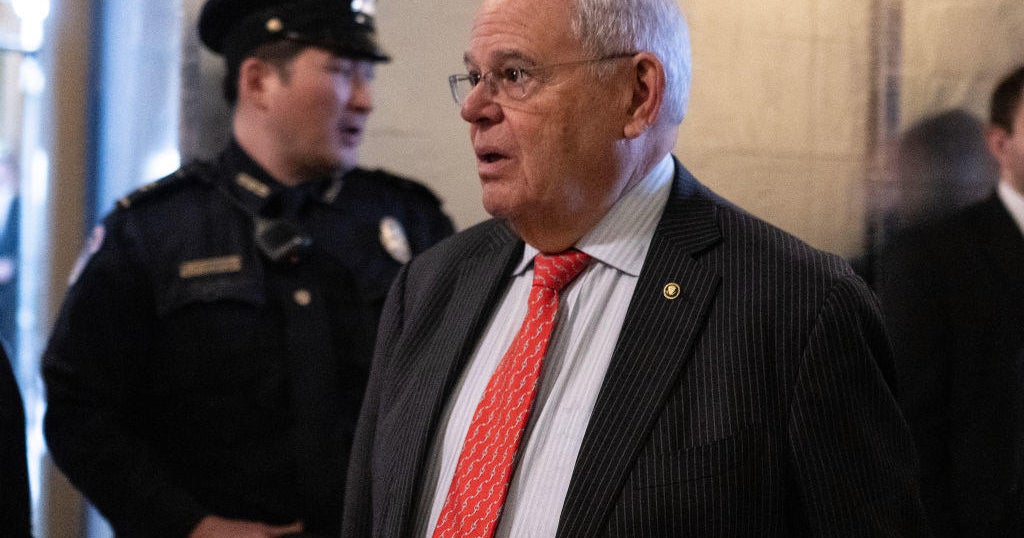
Washington — Federal prosecutors in New York have accused Democratic Sen. Bob Menendez of New Jersey and his wife, Nadine Menendez, of obstructing the investigation into a years-long bribery scheme in which the senator allegedly traded his political influence for money, according to a superseding indictment unsealed Tuesday.
The pair and three New Jersey businessmen were charged last year for conspiring to use Menendez’s power as chair of the Senate Foreign Relations Committee for the benefit of Egyptian and Qatari government officials, and to assist the businessmen overcome various business and legal issues. In exchange, prosecutors said, the senator and his wife accepted hundreds of thousands in cash, gold bars and a luxury car.
Menendez was indicted by a grand jury with about a dozen additional counts on Tuesday that accuse him of working as an unregistered foreign agent of Egypt to secure military financing for that country, accepting bribes to assist one of his co-defendant’s Halal company, and trying to disrupt various criminal investigations. Many of the newly unsealed charges do not allege new conduct, but accuse the defendants of the underlying crimes as part of broader conspiracies.
Prosecutors did, however, allege new obstructive acts. The superseding indictment includes charges against both Bob and Nadine Menedenz of obstruction of justice and conspiracy to commit obstruction of justice.
According to the new court documents, the senator’s wife is accused of meeting with one of the defendants — businessman Jose Uribe — after federal investigators executed search warrants at the Menendez home. Nadine Menendez and Uribe allegedly discussed payments for a Mercedes-Benz convertible he gave to her after the senator allegedly agreed to attempt to “influence” the prosecution of an individual close to Uribe. During the meeting, Uribe agreed that he would tell investigators the car payments were loans, prosecutors said.
The couple is also accused of working to pay back some of the money that prosecutors alleged they took as bribes — writing checks to the businessmen which they described as loans — and selling gold bars.
Menendez, his wife, and two of the businessmen pleaded not guilty earlier this year to the previous set of charges against them. Uribe changed his legal strategy and pleaded guilty last week. He is now cooperating with investigators.
In a statement Tuesday, Menendez claimed he was innocent and accused prosecutors of abusing their power.
“The government has now falsely alleged a cover-up and obstruction,” Menendez said. “The latest charge reveals far more about the government than it says about me. It says that the prosecutors are afraid of the facts, scared to subject their charges to the fair-minded scrutiny of a jury, and unconstrained by any sense of justice or fair play.”
An attorney for one of the defendants, New Jersey developer Fred Daibes, declined to comment.
Attorneys for Nadine Menendez and defendant Wael Hana — who owned a Halal company that the senator is accused of illegally helping secure a distribution deal — did not respond to CBS News’ request for comment.
Previous court documents detailed various meetings between the senator, his co-defendants and Egyptian officials. Prosecutors claimed Nadine Menendez allegedly “had meetings and direct communications with multiple Egyptian officials” and “conveyed information and requests from them to Menendez.”
While executing search warrants in 2022 at the Menendez residence, federal agents recovered more than $480,000 in cash, gold bars, and the Mercedes-Benz convertible that Nadine Menendez allegedly accepted from Uribe, documents show.
Since being first charged last year, Menendez has resisted calls to resign and maintained his innocence, although he did step down from his post as the top Democrat on the Senate Foreign Relations Committee.
Responding to the previous charges, Menendez contended that the cash recovered by federal agents was withdrawn from his personal savings account and kept for “emergencies.”
Last week, a federal judge rejected his claim that the FBI’s searches of his home and electronics were unlawful and incorrect, writing he met the legal requirement of probable cause.
